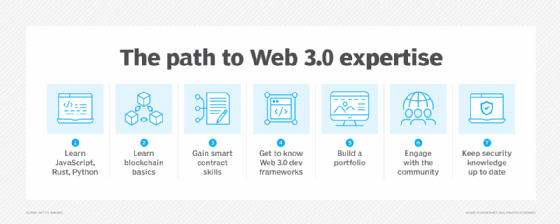How to become a Web 3.0 developer: Required skills and guide
Becoming a Web 3.0 expert means mixing old and new skills.
With the growth and evolution of blockchain technologies, there is a new era of web development with Web 3.0.
Web 3.0 is all about enabling a more decentralized web. It is a web experience with blockchain at the core, providing a foundation for decentralized finance (DeFi), decentralized applications (dApps), smart contracts and non-fungible tokens (NFTs) -- among other emerging concepts.
What is a Web 3.0 developer?
Web 3.0 developers are developers who build the applications, services and infrastructure that define the Web 3.0 era.
More specifically, a Web 3.0 developer is a software developer who specializes in building applications using decentralized technologies. Those technologies include blockchain networks, peer-to-peer data-sharing protocols and distributed storage systems.
What do Web 3.0 developers do?
Web 3.0 developers are generally responsible for the development and management of Web 3.0 applications and services. Common tasks that Web 3.0 developers do include the following:
- Work with blockchain platforms. Web 3.0 developers often work with multiple blockchain ecosystems. Among the commonly used options are Ethereum and Hyperledger Fabric. Developers work on building new applications as well as integrating existing applications with blockchain technology. They might also contribute to developing new blockchain protocols and platforms.
- Develop smart contracts. Creating smart contracts is often a major part of a Web 3.0 developer's job. A smart contract is a type of self-executing program that automatically enforces agreements on blockchain networks.
- Build decentralized applications. Web 3.0 developers create dApps that integrate blockchain technology with functional user interfaces. These applications aim to provide fault tolerance, data integrity and platform flexibility compared with traditional centralized applications.
- Work with decentralized finance. Another core area of focus for Web 3.0 developers is creating DeFi applications. These systems rely on smart contracts and peer-to-peer approaches to enable lending, borrowing and trading.
- API and infrastructure development. Web 3.0 developers often build the necessary APIs and infrastructure components that enable decentralized applications to interact with blockchain networks efficiently, including developing Web 3.0 libraries and tools.
- Implement security protocols. As is the case with any modern application development, security is a priority. Web 3.0 developers implement secure software development practices and conduct regular security audits to help minimize risk.
How to become a Web 3.0 developer
There are several ways that an individual can become a Web 3.0 developer. At the most basic level, a good understanding of the fundamentals of application development is a good start. Becoming a Web 3.0 developer requires following a learning path that builds both foundational programming knowledge and specialized expertise in Web 3.0 tools and frameworks.
This article is part of
What is Web 3.0 (Web3)? Definition, guide and history
Consider the following key steps to become a Web 3.0 developer:
- Learn the basics of blockchain. Blockchain is a primary area of expertise for Web 3.0 developers. To be a blockchain expert, developers must understand distributed ledger technology, consensus algorithms such as proof-of-work and proof-of-stake, and cryptographic principles. Developers must also grasp concepts such as gas optimization, smart contract architecture and blockchain interoperability.
- Gain hands-on experience with development tools. Become familiar with Web 3.0 development tools, libraries and frameworks for blockchain interaction and smart contract development. Popular tools include Hardhat, OpenZeppelin and Alchemy.
- Build a portfolio of sample applications. The best way to become a Web 3.0 developer is to actually develop Web 3.0 applications. Create projects that demonstrate Web 3.0 skills with blockchain, including NFTs and even simple DeFi applications.
- Contribute to open source projects. Engage with major Web 3.0 open source projects such as Ethereum core development, popular DeFi protocols or development tool frameworks. This provides real-world experience and networking opportunities.
- Join the Web 3.0 community. Participate actively in Web 3.0 communities, engage on social media with industry leaders and attend hackathons.

Required skills for Web 3.0 developers
To fully enable and build out decentralized, blockchain-based applications, Web 3.0 developers need to combine traditional software development expertise with more specialized skills.
The following are critical skills required for Web 3.0 developers:
- Smart contract skills. Smart contracts are a foundational element of Web 3.0. Among the most critical skills for smart contract development is familiarity with the Solidity programming language. Solidity is widely used to create smart contracts using Ethereum.
- Programming skills. While Solidity is specifically for smart contracts, Web 3.0 developers need to have a solid base in a core set of programming languages that are widely used in decentralized application development. Required language skills include JavaScript, which is used to interact with blockchain and for front-end development. For those working with the Solana blockchain in particular, the Rust programming language is a required skill. Python is also critical because it is used for both application development and data analysis.
- Development frameworks. Beyond just programming skills in particular languages, Web 3.0 development also tends to rely on a common set of development frameworks. Developers should be familiar with the Hardhat development environments, Web3.js or Ethers.js for blockchain interactions, and testing frameworks for comprehensive smart contract verification.
- Security expertise. Web 3.0 developers must understand common vulnerabilities, implement security best practices, conduct code audits and follow established best practices for security.
Sean Michael Kerner is an IT consultant, technology enthusiast and tinkerer. He has pulled Token Ring, configured NetWare and been known to compile his own Linux kernel. He consults with industry and media organizations on technology issues.








